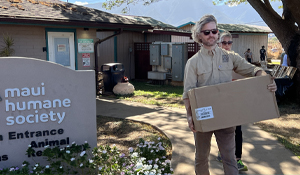The Importance of Biodiversity Conservation
Our planet is abundant with diverse ecosystems, from jungles to deserts, from the deep sea to the frozen tundra.
These ecosystems impact our planet and the unique life living in each, yet many of these environments are threatened and shrinking.
Greater Good Charities is committed to protecting key biodiversity hotspots facing imminent threat by providing the initial key step in conservation—the observation and recording of living species within an ecosystem.
 Photo © Antonella Panebianco
Photo © Antonella Panebianco
What is Biodiversity?
Biodiversity refers to the variety of life at all levels—genes, species, and ecosystems. It includes everything from the genetic diversity within a species, to the broad mix of species in a region, to the ways those species interact with each other and their environments.
Ecosystems with high biodiversity are more resilient. They can better withstand disruption, recover from disasters, and support long-term environmental stability. When biodiversity declines, ecosystems unravel—impacting food supply, disease transmission, and access to clean water and air.

Why is Biodiversity Important?
Biodiversity is the glue that holds ecosystems together. Species and plants interact in complex ways to create balanced and resilient environments. Biodiversity isn’t just about wildlife—it’s about human survival. Healthy ecosystems provide essential services that we often take for granted:
- Food security: Diverse pollinators help crops grow. Fish, livestock, and plant species feed billions of people.
- Water purification: Wetlands and forests filter drinking water and regulate floods.
- Air quality and climate regulation: Trees absorb carbon, cool the air, and release oxygen.
- Disease control: Intact ecosystems regulate populations of disease-carrying organisms.
- Medicinal resources: More than half of modern medicines are derived from natural compounds found in plants and animals.
When species disappear, these systems falter, and communities, particularly those most vulnerable, feel the effects first.
Why is Biodiversity at Risk?
Right now, species are going extinct at a faster rate than at any other point in history. According to World Wildlife Fund's 2022 Living Planet Report, the species population has declined by an average of 69% since 1970. The International Union for Conservation of Nature Red List has more than 157,100 species on it, with more than 44,000 threatened with extinction.
NatureServe’s Biodiversity in Focus: United States Edition lists the main causes of biodiversity loss as habitat degradation, invasive species, dams, and climate change, all of which result from human activity.
Why Is it important to conserve biodiversity?
Protecting biodiversity safeguards life-sustaining systems. But conservation isn’t only about saving individual species—it’s about preserving the balance that allows ecosystems to function. And that starts with understanding what species exist, where they live, and what threats they face.
Conservation strategies include:
- Protecting key habitats and ecosystems
- Supporting anti-poaching and wildlife trafficking enforcement
- Promoting sustainable land and resource use
- Conducting scientific research to guide protection efforts
- Engaging local communities in stewardship of their natural environment
Conservation also depends on public awareness and international cooperation. Biodiversity loss knows no borders—what happens in one region can have global effects.
What is Greater Good Charities Doing to Protect Biodiversity?
Greater Good Charities has a team dedicated to exploring, studying, and protecting key biodiversity hotspots facing imminent threat and loss by observing and recording living species within an ecosystem. These observations are recorded in a public database for researchers, students, and scientists to use.
To date, our database has over 62,000 processed plant and animal records and continues to grow.
 Photo © Sky Jacobs |
 Photo © Sue Carnahan |
 Photo © Greater Good Charities |
Throughout the year, groups of uniquely qualified and multinational scientists gather to observe and collect scientific data on a specific area’s native plants and animals. With each expedition, our team continues to build our collective knowledge of this special place and document ecological shifts from previous data collections.
All data is then added to a public, all-species database, which can be used for current and future research, environmental education, and habitat protection.
Each expedition makes roughly 1,000 observations of animals and plants. Scientists, conservationists, and universities worldwide use these records to protect biodiversity hotspots.
How You Can Support Biodiversity Conservation
- Stay informed: Learn about the ecosystems and species that need protection.
- Support science: Research is a critical first step to understanding what needs to be protected—and how.
- Donate to conservation efforts: Your support helps protect endangered species and the ecosystems they depend on.
- Speak up: Share the importance of biodiversity with your community and policymakers.
Biodiversity Is Life. Protecting It Is Our Responsibility.
Biodiversity is not optional—it’s essential. Its protection is directly tied to human health, food, safety, and climate resilience. And while the threats are serious, the solutions are within reach—if we act now.
Protecting biodiversity means protecting life. For today. For future generations. For the planet we all share.
Your support helps Greater Good Charities document and restore the world around us.


